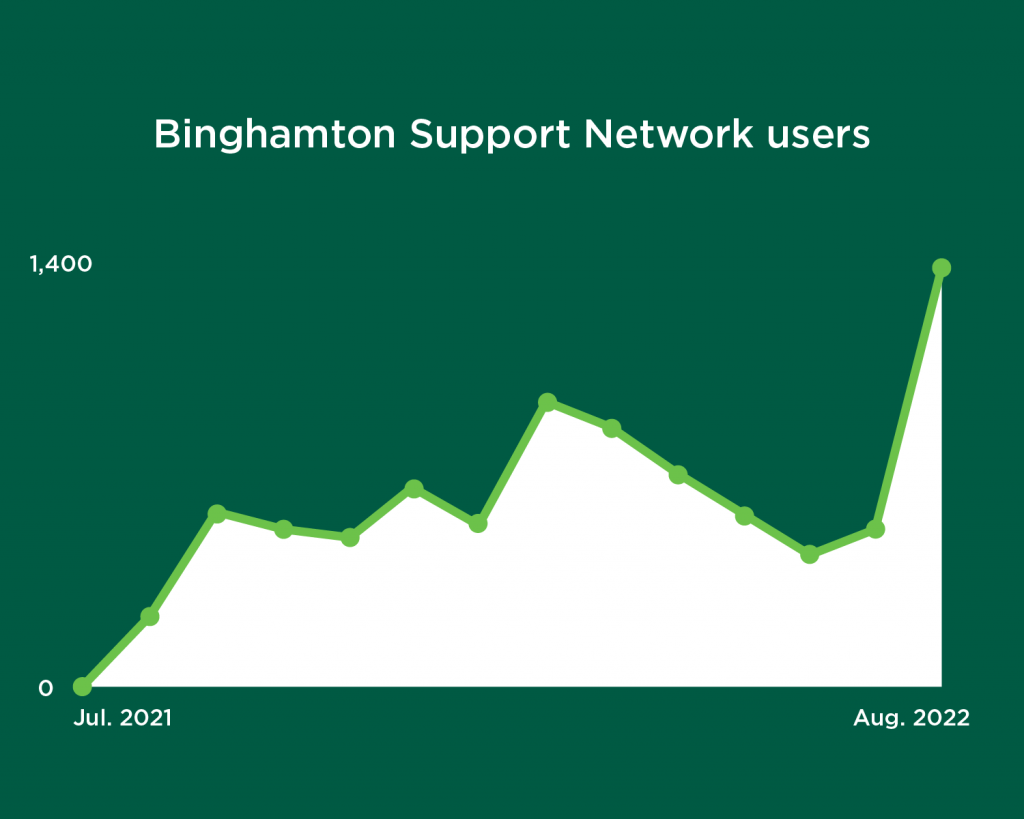Over the past year, Binghamton University has been pursuing initiatives for student mental health advocacy.
In 2021, the University implemented the Binghamton Support Network, a database that allows students to type in a concern and generate a list of on- and off-campus resources. Data shows that over the last 14 months, there has been increased traffic on the page, indicating that students are making use of the new mental health resources on campus. New positions, certifications and resources concerning mental health have also been instated in multiple on-campus organizations, spanning from the University Counseling Center (UCC) to the University Residential Life Office.
Johann Fiore-Conte, BU’s associate vice president for student affairs and chief health and wellness officer, elaborated on some of the newly implemented mental health initiatives.
“The University is continuously monitoring national and campus trends to student well-being and demand for services adapting and re-evaluating.” Fiore-Conte wrote in an e-mail. “Our approach consists of strategies that are proactive and in response to assessed student needs.”
The UCC has hired two new treatment coordination specialists to provide assistance to students who need to seek off-campus services. According to Fiore-Conte, identifying resources and navigating health care systems and insurance can be challenging. The new hires have allowed the University’s treatment coordination to be the highest it has in three years, and Fiore-Conte said the University is pleased to be able to provide this assistance for students.
In the Sept. 23, 2022 BU Council meeting, the University announced its new contract with vendor BetterMynd, which provides colleges and universities with a wider scope of mental health resources through tele-counseling. Fiore-Conte explained that the agreement will increase student access to care during the more demanding times of the academic year, open access to weekend and evening hours and provide an expanded pool of diverse therapists.
“As a healthy campus, we believe that everybody has a role in student mental health, and that knowledge skills and tools help us help each other.” Fiore-Conte said at the BU Council meeting. “The more tools and knowledge we can introduce to the campus community, the healthier our campus community will be.”
The campus has invested in the certification of four staff members as trainers in Mental Health First Aid (MHFA), a national initiative that provides skill-building in recognizing emotional distress, responding to the distressed individual and referring them to the appropriate resource. Since the start of the fall 2022 semester, 113 individuals on campus have been trained and subsequently certified.
The University Residential Life Office has also created a new position that will focus on the residential wellness initiatives being implemented. The position will allow for further development of the Masters of Social Work (MSW) program within Residential Life, according to Fiore-Conte, in which MSW interns can provide residents in their living communities with support.
“At the SUNY System level, we understand that there are conversations regarding the potential additional resources to campuses for supportive programs and services,” Fiore-Conte wrote. “There is a robust network of supports available to students in support of emotional well-being.”
Students can seek assistance from any of the campus resources, such as the BSN, the UCC or the Violence, Abuse and Rape Crisis Center (VARCC).
Rebecca Piccigallo, a junior majoring in philosophy, politics and law, shared her experience with the UCC.
“Scheduling an appointment with the UCC was quick and easy.” Piccigallo said. “I just called them and they were able to get me in within a few days. There was no insurance necessary to book an appointment with them, which is very beneficial for people who do not have access to it.”
Codie Fiske, a senior majoring in linguistics, said he was glad to see the University’s new mental health initiatives.
“It’s great to hear that the school is taking initiatives toward student mental health advocacy,” Fiske said. “Mental health is such an important topic in our society and especially as college students we need to prioritize our well-being. Having resources like this available on campus is great for students in need.”



